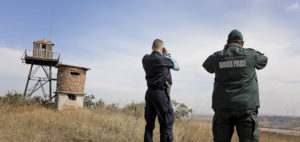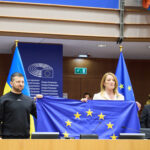In 2019, only about a third of asylum seekers whose application had been rejected returned to their countries of origin
Of those, around one third did so voluntarily, with the rest being deported forcibly by the authorities. The European Commission admits that the low return rate is also due to fragmented and inefficient procedures within the union and not just on recalcitrant countries outside the EU when it comes to the readmission of returnees.
Now, the Commission has presented proposals aimed at improving the return rates of rejected migrants. It wants to put in place an EU-wide system,which it deems “an essential component of a comprehensive and integrated migration management”. However, the Commission said that it would measure the success or the failure of the new returns policy not just based on higher numbers, but also take into account whether the deported could return in dignity to their countries of origin and re-integrate there. The EU executive also wants to encourage voluntary returns.
Frontex
At the heart of the Commission’s plan is Frontex, the EU agency based in Warsaw which polices the EU’s external borders together with the police forces of the member states. “Frontex will become the European Union’s returns agency,” Commission Vice-President Margaritis Schinas said when presenting the proposals. A new Frontex director who will be put in charge of returns is to be hired soon.
Other key elements of the new returns policy are:
- Faster screening procedures for asylum applicants arriving at EU borders and immediate return of those whose application has no chance of being accepted
- More voluntary returns (i.e. rejected asylum seekers returning based on their own free will)
- Creation of a common EU return system based on the amendments to the existing Return Directive
- Introduction of a new border procedure allowing for speedier returns
- A return sponsorship model that would allow for better European cooperation where there is pressure on national systems
- The appointment of a Return Coordinator, who will be supported by a new network of member states’ representatives
- The creation of partnerships with non-EU countries using – in the words of the Commission – “all the necessary policy instruments available, including on matters of return and readmission and the full implementation of the new Visa Code”
Voluntary return is usually much cheaper than forced deportations. The Commission said it “gives returnees real opportunities and takes into account their needs, expectations and prospects once returned.” Rejected asylum seekers or other people with no right to stay in an EU member state are generally given between a week and a month to leave voluntarily. During this period, the authorities may not enforce the decision unless they identify a risk of absconding or security risks.
More voluntary returns
To encourage and facilitate voluntary returns, member states may offer to assist the returnee with travel expenses or provide him or her with help, in cash or in kind, for a short period upon arrival. The EU also supports voluntary returns from partner countries, for example in the framework of the EU–International Organization for Migration (IOM) Joint Initiative in Africa and to returnees from Afghanistan and Bangladesh.

Photo: Shutterstock
Moreover, since 2018, the EU has funded a European Return and Reintegration Network to facilitate cooperation between national migration authorities. The Commission has also developed a framework on return counselling to provide guidance to national organisations in setting up, managing and developing counselling structures in EU member states. It is working on a common curriculum for return counsellors.
Stricter visa policy?
However, the Commission is also putting pressure on countries in Africa and Asia which have so far been reluctant to accept back nationals who sought asylum in Europe. One element the EU could wield is the threat to revoke visa-free travel for nationals from countries that refuse to take back in their citizens. Commissioner Ylva Johansson, in charge of the home affairs portfolio, is currently renegotiating several readmission agreements, and might be tempted to use that threat.
However, the national interest of EU states is often at stake, as are bilateral relations with countries in Africa and Asia, and some EU governments might be reluctant to sacrifice them on the “altar” of a common EU policy on returns.
The Commission’s proposals have yet to be accepted by the European Parliament and the 27 member states. Negotiations over the Commission’s New Pact on Asylum and Migration, presented last September, are protracted, and it is not yet clear if they will succeed at all.
Read more about the EU’s return strategy
Author: Michael Thaidigsmann






